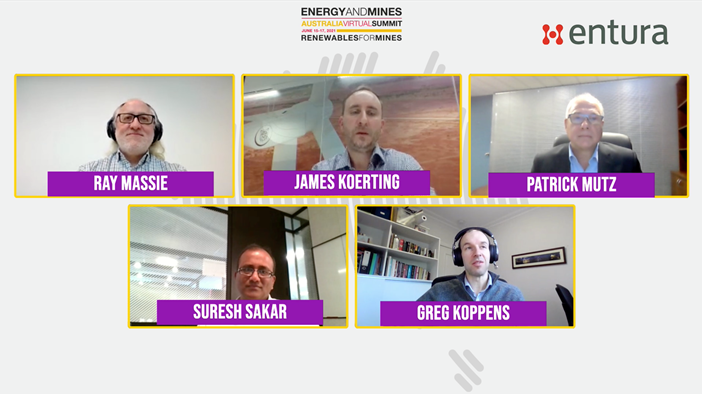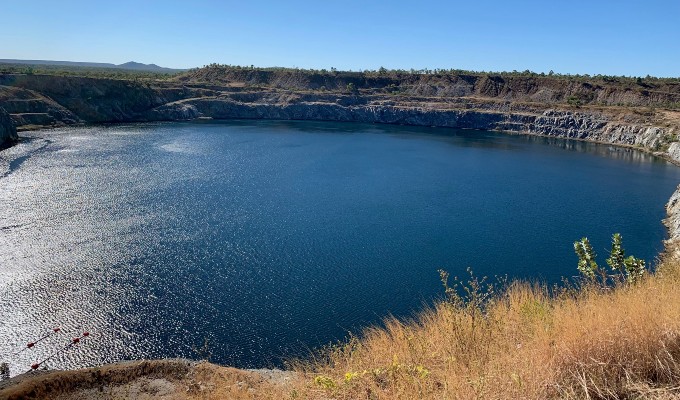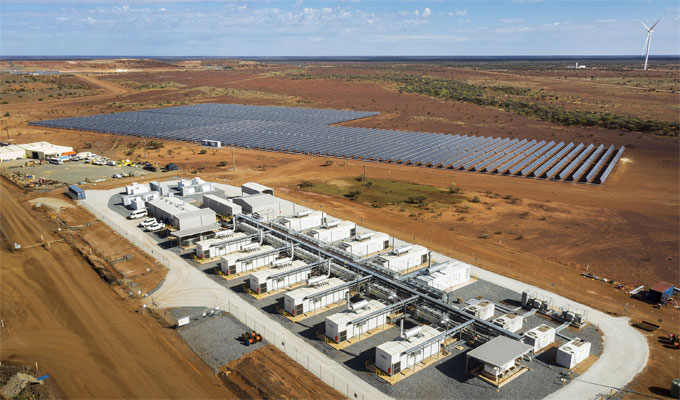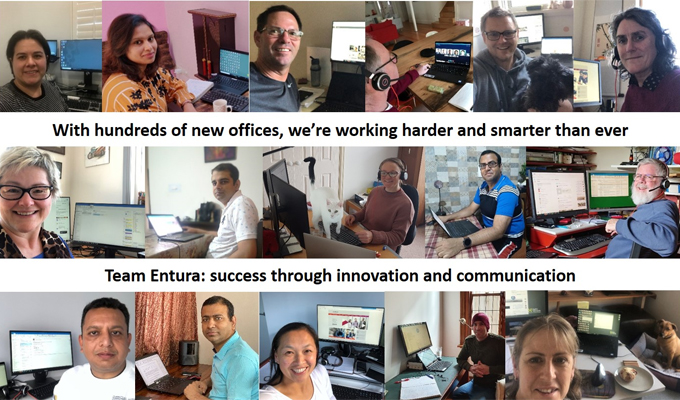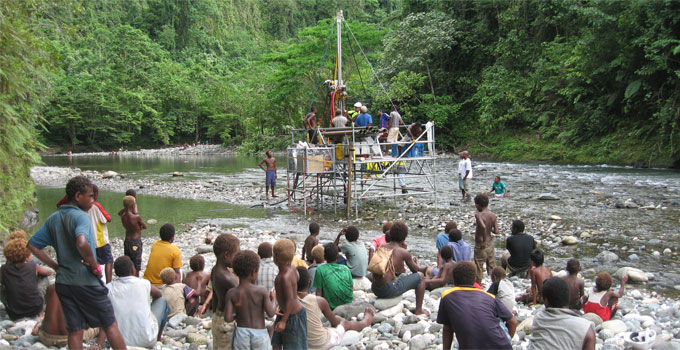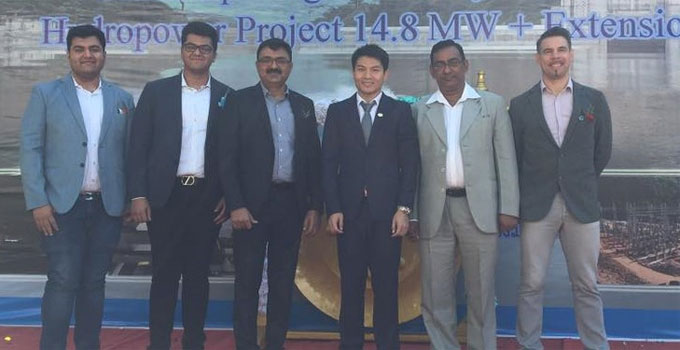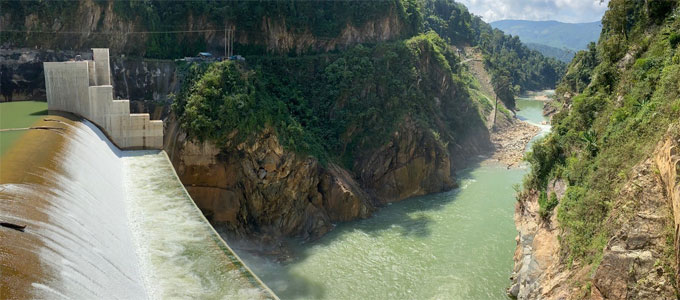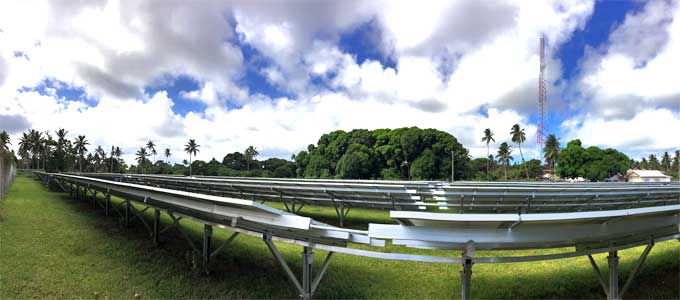Entura expertise and contributions recognised
Entura’s leading specialist dams engineer Paul Southcott won Professional Engineer of the Year, at the Tasmanian awards ceremony held in Hobart on Thursday 5 August 2021. Paul will now represent Tasmania at the national Australian Engineering Excellence Awards later in the year.
Andrew (Drew) Shaw, Entura’s Senior Technical Officer Civil, will also be attending the national awards as a finalist in the Engineering Technologist category.
Civil engineer Edward Snowball was a finalist for Young Professional Engineer of the Year.
The Australian Engineering Excellence Awards (AEEA) identify, recognise and reward outstanding achievement in the practice of engineering and service to the profession, promoting industry excellence across engineering projects and professionals, and highlighting the significant contribution engineering makes to communities.
“Paul, Edward and Drew have all made substantial contributions to the development of renewable energy and water projects in Tasmania, mainland Australia and throughout the Indo-Pacific,” said Tammy Chu, Entura’s Managing Director. “We’re incredibly proud to have them all as part of our Entura team, and it is a pleasure to see them apply their varied skills to create safe and sustainable power and water solutions that make positive, lasting contributions to communities.”
Paul Southcott said, of winning the award, “I am very honoured to be recognised for my contribution to the engineering industry through over 30 years of project work, industry development, teaching and mentoring.”
“I’m proud to have played a role in creating and maintaining safe dam infrastructure that not only meets our clients’ immediate needs, but also builds a healthier, safer and more sustainable future in Australia and around the world.”
Drew Shaw said, “I am always excited and motivated by sharing knowledge and improving systems and practices. I relish the opportunity at Entura to apply leading digital engineering technologies to deliver value and achieve results for our clients.”
Entura has been well represented at the awards in previous years, with a number of individuals and projects reaching the finals or winning awards, including winning the Professional Engineer of the Year (Seth Langford 2020, Donald Vaughan 2018) and Young Professional Engineer of the Year (Lyndon Johnson, 2018).
Entura shares floodplain management insights at national conference
Entura’s Graduate Hydrologist Ashiq Rasheed presented at the 2021 Floodplain Management Australia National Conference, which was conducted as a virtual conference in June.
The conference brought together a range of stakeholders from across Australia to explore the theme of ‘Essential Knowledge for a Flood Resilient Future’. Discussions and presentations focused on the latest developments and achievements in flood and emergency management to assist in identifying, planning for and managing flood risks, as well as building disaster-resilient communities.
Ashiq was invited to present at the conference on behalf of Entura, producing two informative posters on flood forecasting studies that Entura has conducted on the extensive water assets of Hydro Tasmania. His first poster discussed the hydraulic and hydrologic modelling processes used for dam-break consequence assessments of the dams in the lower Derwent scheme. His second presentation covered the flood forecasting component of Hydro Tasmania’s large dams portfolio, as part of Hydro Tasmania’s broader Dam Safety Emergency Plan (DSEP).
View them both below.
“The posters we presented explored the hydrology and hydraulic modelling of an important, extensive cascade of Hydro Tasmania dams,” said Ashiq.
“This is technically intense work on an extremely large scale, so we have experience and knowledge worth sharing.”
Other guest speakers explored flood-related environmental impacts, social and cultural aspects, flood policy and more.
“It was exciting to see the flood management community around Australia coming together to share ideas, learn from each other, and discuss ways to improve sustainability, community safety and resilience,” Ashiq said.
“Being involved in this conference was a valuable opportunity to make the wider community aware of the excellent work Entura does and why our specialists are thought leaders in floodplain management and champions for flood resilience.”
Learn more about flood management in these articles from our thought leaders, discussing how to keep safe around dams, forecasting for smarter flood solutions and key considerations for better flood forecasting.
Entura leads discussion of renewables in mining sector
Two of Entura’s thought leaders recently attended this year’s virtual Energy and Mines Australia summit, which took place earlier this week.
Hybrid Energy Solutions Specialist Ray Massie and Secondary Electrical Team Leader Greg Koppens led a panel discussion on “Lessons Learned and Next Steps for Mining Hybrids”, providing critical insights on the topic and the industry’s renewable future. They were joined by fellow panellists James Koerting, Energy Manager of Gold Fields Australia, Image Resources MD and CEO Patrick Mutz and Suresh Sakar, the Australian Engineering Manager for Iluka Resources.
The session explored various questions pertaining to the future of hybrid renewables in the mining sector. Panellists discussed ways to increase renewable penetration, escalate hybrid projects and improve energy storage solutions, as well as identifying hybrid renewables opportunities in the mining sector.
Both Greg and Ray came away from the conference with new industry insights, and reflected on how much attitudes towards renewables in the sector have changed in the past year or so.
“I think we’re starting to see more thinking and questions around the demand side – so how the process and the plant itself is operated,” said Ray.
“Twelve months ago, six months ago, it was just how do we put renewables in? Now it’s starting to shift to the question of how we change our world to maximise the benefit of that new paradigm.”
With new approaches emerging to integrate hybrid renewables in mining, Greg explained the new challenge for mining process engineers.
“One thing that I’d like to be a takeaway message is the challenge to mining process engineers to be flexible when they’ve got plenty of energy and when there’s a scarcity of energy, and to design their intermittent processes to take advantage of that,” he said.
“When you’re using free power, it’s green, you’re not burning any fuel to produce it, and your operating cost is cheaper.”
The three-day summit welcomed discussions from an array of industry figures bringing their different views of how to move towards a future of carbon-free mining. Although held virtually, the event was an important opportunity to connect with other industry peers and learn from each other.
“Everybody wins if you start to share your information and knowledge,” Ray said. “It’s refreshing to see how rapidly the mining sector is taking this on. Sometimes, seeing that another plant is doing it and working fine is enough to give other miners the confidence to transition too.”
“For every conversation at the conference, behind the scenes there are many more miners sharing their learnings, so these events accelerate change.”
Entura’s presence at the conference enabled us to engage in these conversations and demonstrate why we’re a leader in advanced off-grid hybrid integration systems.
“That’s one of the things about Entura,” said Greg. ‘We’re here to make a difference and lead the renewable revolution. It’s about continuing to be there at the front and to push that envelope.”
You can watch the full session here.
Entura welcomes announcement of Genex Power’s major milestone for Kidston Pumped Storage Hydro project
Specialist power and water consulting firm Entura welcomes Genex Power’s achievement of financial close on its flagship 250 MW Kidston Pumped Storage Hydro Project in North Queensland.
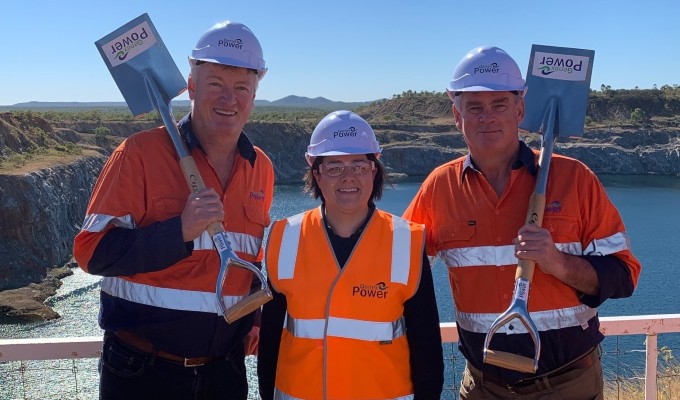
L-R: Simon Kidston, Genex Executive Director, Tammy Chu, Entura Managing Director and Michael Addison, Genex Non-Executive Director.
Following the issuing of Notices to Proceed, design and construction activities have commenced on the project, which is expected to be completed in 2024.
Entura was engaged in 2018 to deliver Owner’s Engineer services for the project. Entura previously completed the Technical Feasibility Study for the Kidston Pumped Storage Hydro Project, focusing on optimising the project to achieve a design which was technically and commercially feasible.
The project is only the fourth pumped hydro project to be built in Australia, and will utilise two disused gold mine pits as its upper and lower reservoirs.
“We’re pleased to be partnering with Entura again to support the delivery of this landmark project in Queensland,” said James Harding, CEO of Genex Power.
“The Kidston Pumped Storage Hydro Project will pave the way for renewables to play a larger role in Australia’s electricity grid,” said James Harding. “Entura’s wealth of experience and capability in renewables and network integration, along with intimate knowledge of the Kidston Pumped Storage Hydro Project, makes Entura the ideal partner to enable the success of our projects.”
As Owner’s Engineer on the Kidston Pumped Storage Hydro Project, Entura will play a vital role in ensuring timely, quality outcomes for Genex Power during the construction phase of the project.
Entura’s scope includes a review of activities (detailed design and engineering verification, review of EPC contractors’ plans, and grid connection arrangement), project management, construction and commissioning advice.
Commenting on the announcement, Entura’s Managing Director, Tammy Chu, said, “We congratulate Genex on this major milestone and stand ready to support Genex to deliver its renewable energy vision.”
“As passionate advocates for dispatchable renewables, Entura is delighted to have the opportunity to continue to strengthen the relationship we have developed with Genex during our work so far on this ground-breaking pumped hydro project, as well as through our Owner’s Engineer role on the Jemalong Solar Farm.”
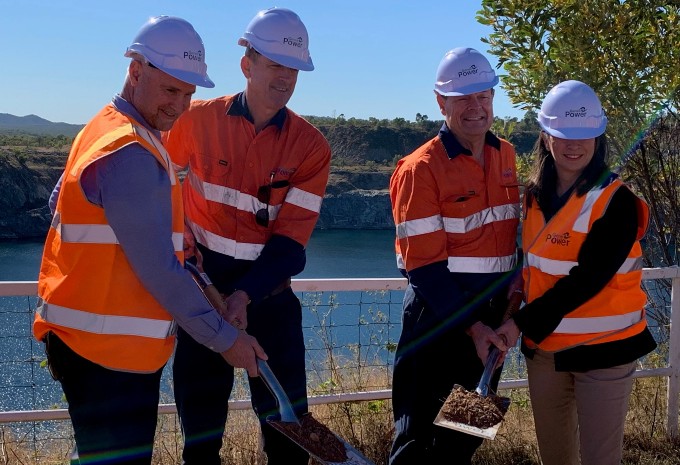
L-R: Glenn Butcher, Queensland Minister for Regional Development and Manufacturing and Minister for Water, James Harding, Genex Chief Executive Officer, Dr. Ralph Craven, Genex Non-Executive Chairman and Senator Susan McDonald, Senator for Queensland.
Genex Power expects the pumped hydro project to create more than 800 jobs in the region over the four-year construction period, and to deliver significant benefits to the electricity network in North Queensland.
Financiers include the Northern Australia Infrastructure Facility, the Australian Renewable Energy Agency, the Clean Energy Finance Corporation, and the Queensland State Government.
“Entura is pleased to be able to play a role in the realisation of the first pumped hydro project in Australia in decades,” said Tammy Chu, “which will serve as a leading example of how pumped hydro can deliver the rapid-response, flexible power to mitigate challenges in our transitioning energy system and achieve a sustainable, reliable and affordable energy future.”
Entura is one of the leading consultants in renewables development and integration in Australia and the Indo-Pacific region, with significant experience in utility-scale hydropower, pumped hydro, solar and wind farms, energy storage and grid connection. The firm works with clients to help tackle the challenges of creating hybrid renewable energy projects, from grid-connected and utility-scale to small, isolated systems.
Entura was also previously appointed as Owner’s Engineer for Genex’s Jemalong Solar Farm in NSW.
Entura makes a welcome return to in-person and onsite dam safety training
Entura is continuing its efforts to educate and empower the water industry with a return to delivering in-person, onsite training thanks to the easing of COVID restrictions in Tasmania.
Entura’s clean energy and water institute (ECEWI) recently delivered its first in-person, onsite dam safety course at its Cambridge office in Tasmania since the beginning of the COVID-19 pandemic.
Eight participants from TasWater attended the ECEWI dam safety awareness refresher course, which included classroom training held at Entura’s dedicated training space. The training was conducted by Entura’s senior civil engineer and accredited trainer, Shao Ng.
Shao reinforced the participants’ awareness of key components of dam safety. Topics included identifying risks such as embankment dam erosion, seepage, turbidity, cracking, and concrete dam defects, as well as key items to inspect and possible remedial actions.
TasWater participants were also able to visit a dam site at Flagstaff Gully near Hobart to apply their classroom learning in the field.
“All the participants were keen to learn and update their skills throughout the classroom training, which was topped off with a practical site visit,” said Shao. “The training was a success, with immediate relevance to the participants’ daily jobs.”
This training course was the first of many upcoming onsite refresher training sessions that ECEWI will deliver for TasWater, with the aim of training 100 participants by the end of 2021.
“For TasWater, ECEWI can deliver training particularly efficiently as we have a longstanding and strong working relationship with TasWater, and know its assets very well through our ongoing projects,” said ECEWI’s Program Coordinator, Leesa deGroot.
These will be conducted through a mix of face-to-face onsite training and MS Teams theory sessions, with practical sessions to follow. This will allow more people to be involved at one time and reduce the impact on participants’ work requirements.
ECEWI also recently conducted an accredited training course in Launceston for TasWater, Tasmanian Irrigation and the TasWater Capital Delivery Office. The two-day course consisted of a day’s theory session, assessments to show competency in these areas, and a visit to a dam site where students could demonstrate practical competency. The three units of competency are mapped under the national water package. ECEWI is one of the few RTOs in Australia to run these skillset training packages.
As well as local and national training opportunities, ECEWI is currently organising a 15-day remote training program with participants in the Philippines, scheduled for August.
“This very large training program will cover many different disciplines and will be a challenge,” said Leesa, “however, we look forward to delivering remote training to this overseas cohort and continuing our contribution to a safer dams industry throughout the Indo-Pacific region, despite ongoing international COVID circumstances.”
In November 2020, ECEWI conducted a remote six-day seminar with the Malaysian National Committee on Large Dams (MYCOLD), which will be followed with an in-country training session in late 2021 in Malaysia, depending on the coronavirus circumstances at that time.
“Offering tailored training to the power and water industry through ECEWI is one way in which Entura supports resilient infrastructure for sustainable communities,” said Amanda Ashworth, Entura’s Director of Strategy, Sales and Commercial.
Entura’s studies culminate in selection of preferred Tasmanian pumped hydro site
Entura welcomes the significant milestone, announced this week, that Lake Cethana has been selected as Hydro Tasmania’s preferred site for a Tasmanian pumped hydro opportunity, with the project now set to progress to final feasibility stage.
Entura has been instrumental in the pre-feasibility and feasibility investigations of three promising Tasmanian pumped hydro sites, narrowed down from early studies of 14 options.
Pumped hydro opportunities at Lake Cethana and Lake Rowallan in Tasmania’s North West and another near Tribute Power Station on the West Coast were prioritised for assessment on a range of technical, environmental, social and economic factors.
“This announcement is the culmination of an enormous effort over the past two years from Entura’s specialists in engineering design, environment, stakeholder engagement and planning,” said Entura’s Technical Design Manager of the Battery of the Nation pumped hydro feasibility studies, Nick West.
“The Cethana option has deep storage capacity, greater cost certainty, environmental and social sustainability, and flexibility in sizing and capacity, making it the preferred site for finalisation of feasibility studies,” he said.
“We are excited to be progressing Tasmania’s Battery of the Nation opportunity with storage infrastructure that will support Australia’s clean energy transition.”
Feasibility studies on the Lake Cethana pumped hydro project will continue in 2021, including more on-ground investigations and engagement with local communities and stakeholders to look more closely at technical, social and environmental factors associated with the project.
The announcement came alongside the signing of a bilateral Memorandum of Understanding (MOU) between the Tasmanian and Australian Governments, marked by a visit from the Prime Minister, Tasmanian Premier, and Federal and State Energy Ministers to Trevallyn Power Station.
The MOU outlines a shared path forward for further progressing Marinus Link, which would provide 1500 MW of new interconnection between Tasmania and mainland Australia. The MOU also includes support for the pumped hydro and hydropower upgrade opportunities in the existing portfolio that form the Battery of the Nation initiative.
“The announcement of the selection of Cethana and the signing of the MOU are major milestones for Battery of the Nation,” said Tammy Chu, Entura’s Managing Director.
“With progress on the Cethana pumped hydro project and Marinus Link, Tasmania can look forward to unlocking our cost-effective, dispatchable, highly flexible renewable energy and deep storage capacity so that it is ready when the market needs it,” she said.
“At this pivotal time in Australia’s energy transition, Entura is proud to apply our extensive hydropower and pumped hydro expertise to support Tasmania’s journey beyond 100% renewables and its provision of affordable, reliable, sustainable energy to the nation.”
The Cethana pumped hydro development pathway will align with development milestones for the second of the two 750MW Marinus Link interconnectors.
Pre-feasibility studies were jointly funded by the Australian Renewable Energy Agency (ARENA) and Hydro Tasmania.
Announcements made this week included support for progressing another component of the Battery of the Nation opportunity: the redevelopment of Hydro Tasmania’s existing Tarraleah hydropower scheme to be able to take advantage of Tasmania’s increased ability to export power into the National Electricity Market via Marinus Link. Feasibility studies for the redevelopment have also been undertaken by Entura and early works on the project could potentially start as soon as 2021.
Entura to continue to support renewable energy in the Pacific with appointment to AIFFP panel
Entura is pleased to announce that we have been appointed by Australia’s Department of Foreign Affairs and Trade to join the panel of preferred service providers for the Australian Infrastructure Financing Facility for the Pacific (AIFFP).
Our successful appointment attests to the strong reputation we have built in the sector for our contributions to creating safe and sustainable power and water solutions in the Pacific over many years.
The appointment positions Entura as a preferred supplier for client-side project management services in the region, and is likely to secure us a pipeline of power and water projects in the Pacific over the next five to ten years.
The AIFFP is a new initiative for the Australian Government as part of Australia’s ‘Pacific Step-Up’. It will form partnerships with governments and the private sector in the Pacific and Timor-Leste to provide grant and loan financing for transformational energy, water, transport, telecommunications and other infrastructure.
Projects supported by the AIFFP are already underway in Timor Leste, Papua New Guinea, Palau and Fiji.
Entura has worked extensively in the Pacific, and is currently involved in projects in the Solomon Islands, Tonga, Samoa, Cook Islands, Tuvalu and the Federated States of Micronesia.
“Entura’s vision is to create safe and sustainable power and water solutions that make positive and enduring contributions to our clients and to communities throughout the Indo-Pacific region, and we are eager to continue supporting our Pacific neighbours to achieve their energy and climate goals,” said Tammy Chu, Entura’s Managing Director.
Entura’s Bunfu Yu wins at 2020 National Awards for Planning Excellence
Bunfu Yu, one of Entura‘s planning consultants, has won the Outstanding Student Project award at the 2020 National Awards for Planning Excellence hosted by Planning Institute Australia (PIA).
Her submission, ‘The Role of Spatial Planning in Energy Provision’ looked at how the speed of change in energy systems is outpacing the adaptability of planning systems. At a time when energy development across Australia is gaining momentum, Bunfu’s research is both timely and essential, and is part of Entura’s comprehensive approach for complex projects.
In awarding Bunfu, the PIA commented, “Her analysis looks beyond the data, going further to extrapolate what it means for the future by suggesting very practical solutions which could be taken up by policy makers.” Her submission considered six principles of effective energy planning: good governance, integrated strategies, environmental sustainability, locational dependency, cross-sectoral coordination and performance-based assessment.
Bunfu was delighted to win the award saying, “It’s very satisfying to complete my Masters thesis and be rewarded with this accolade. Working at Entura has highlighted the real need to make sure the energy industry and planning discipline are working closely together. ”
“Bunfu has a great career ahead of her and I’m so pleased to have her as part of our team. Her talent and skills together with her real-world experience deliver tangible value to our clients,” said Tammy Chu, Entura’s Managing Director.
Bunfu has previously won the Mike Shield Award for academic excellence and best performing graduating student in Master of Planning, University of Tasmania & Planning Institute of Australia (TAS Division). She has worked at Entura since April 2018.
Entura’s Seth Langford named Professional Engineer of the Year 2020
Entura is committed to supporting the transition to reliable, sustainable and cost-effective renewable energy in Australia and the Indo-Pacific. One of Entura’s engineers has received the top accolade at the Tasmania Engineering Excellence Awards for his contribution to renewable energy developments over 18 years.
Seth Langford, a leading specialist renewable energy engineer at Entura, was yesterday named Professional Engineer of the Year.
The Australian Engineering Excellence Awards (AEEA) identify, recognise and reward outstanding achievement in the practice of engineering and service to the profession, promoting industry excellence across engineering projects and professionals, and highlighting the significant contribution engineering makes to communities.
“Seth has made a substantial contribution to the development of renewable energy projects in Tasmania, mainland Australia and throughout the Indo-Pacific,” said Tammy Chu, Entura’s Managing Director. “Seth’s knowledge and experience place him at the forefront of efforts to transition to a renewables-based energy sector and we’re very proud to have him as part of our team.”
Commenting on the award, Seth Langford said, “It’s a great honour to receive this award, and I’m delighted to be recognised as an advocate for renewable energy. Enabling more renewables not only meets our clients’ needs, but also builds a healthier and more sustainable future for communities through clean, reliable, accessible electricity.”
“While this is an individual award, my achievements also reflect the expertise, innovation and professionalism of many colleagues at Entura,” said Seth.
“Seth has demonstrated exceptional project management capabilities and deep technical and commercial insights,” said Tammy Chu. “He finds effective and resourceful solutions to challenging projects, and also brings outstanding personal characteristics of collaboration, negotiation and accountability.”
Seth was instrumental in project-managing the construction of the pioneering Flinders Island Hybrid Energy Hub – a highly complex world-leading megawatt-scale hybrid renewables system with zero-diesel capability, completed in 2018. The innovations developed in the Flinders Hub project have facilitated further hybrid renewables projects at Coober Pedy and Rottnest Island, and recently in the Agnew Renewable Energy Project.
Seth is currently project managing the ‘Battery of the Nation’ feasibility study exploring repurposing Tasmania’s ageing Tarraleah hydropower scheme for adaptive use in a new energy market framework to provide capacity to support the integration of variable renewable energy projects. He is also project managing the feasibility studies for new pumped hydro opportunities in Tasmania. These projects are fundamental both to Tasmania’s Renewable Energy Action Plan and to the decarbonisation of Australia’s National Electricity Market.
As the divisional winner of the Professional Engineer of the Year award, Seth will automatically progress to consideration for the national Engineer of the Year award, which will be announced later this year.
Entura has been well represented at the awards in previous years, with a number of individuals and projects reaching the finals or winning awards, including winning the Professional Engineer of the Year (Donald Vaughan) and Young Professional Engineer of the Year (Lyndon Johnson) in 2018.
COVID-19 update – August 2020
At Entura, we remain committed to you and your projects during the COVID-19 pandemic, wherever we are.
Life and projects go on, even in a pandemic. We will continue to be flexible and creative as we explore opportunities to progress your projects in what remain uncertain times, for you and for us.
Our people have adapted well to a hybrid working environment. Our office in Hobart has re-opened, adhering to a strict COVID-19 Safety Plan to keep our people and communities safe. Field work continues, where possible, under strict conditions. And all our people are able to continue to work from home effectively and as needs be, especially in Melbourne and Delhi, where our offices remain closed. Inter-State and international travel restrictions are, however, still impacting people and projects.
We will continue to work with you to agree the best way forward for your project. We have become adroit at re-scoping and rescheduling projects and redirecting effort. Please keep us up-to-date so we can respond in the best way possible, as things change for you and for us.
Let’s keep working together to find a safe way through this maze that is COVID-19.
We have updated our Business Continuity Plan to respond to the most recent developments, especially in Victoria.
Please contact us if you would need to find out more about our response, or download our Business Continuity Plan summary here.
Coping with COVID-19: What are industry leaders saying?
In the latest issue of International Water Power & Dam Construction magazine, a number of professionals in the industry share their experiences – both personal and professional – of coping in the unsettling times we’re all experiencing due to COVID-19.
In the feature, Entura’s Managing Director, Tammy Chu, shares some thoughts about how we’re rising to the challenges and also finding some positive aspects amidst change and uncertainty.
Access a PDF of the feature here.
Entura delivers on the Agnew Hybrid Renewable Project, despite COVID-19
Entura has completed the design, delivery and commissioning of a microgrid control system for the Agnew Hybrid Renewable Project in remote Western Australia, despite the challenges of keeping its people safe and complying with travel and quarantine restrictions during the COVID-19 pandemic.
The Agnew Hybrid Renewable Energy Project, owned and operated by energy producer EDL, powers global mining company Gold Fields’ Agnew gold mine through a combination of solar and wind generation, battery energy storage, and gas and diesel generation. It is the first of its kind in the mining sector in Australia, and certainly the largest.
The role of the control system, delivered by Entura, is to coordinate all of the power system elements to maximise the amount of renewable energy used and to ensure the system remains stable.
“The control system is key to achieving the renewable contribution target: without a control system to coordinate all the pieces, it’s impossible to push significant renewables into the microgrid and maintain power quality,” said Ryan Willems, a Senior Renewable Energy Engineer at Entura.
“The control system calculates set-points for the solar, wind and battery systems depending on system conditions and how many gas generators are online, managing the renewables and battery around what the thermal power station is doing.”
At a critical stage of the project, Hobart-based Ryan needed to be safely returned home from the distant and remote project location to Tasmania due to COVID-19 travel restrictions and Entura’s commitment to the safety of its workers.
During a fortnight of mandatory isolation, Ryan was able to remotely commission the control system – a highly unusual method of operation, but a successful and safe compromise that ensured that the project could remain on track.
“Our previous hybrid renewables projects have resulted in Entura achieving several world-firsts for microgrids, so it’s always exciting to be pushing the envelope of what’s possible at the forefront of the industry, even from a desktop in a hotel room rather than out on site,” said Ryan.
“The Agnew project demonstrates another significant advance in Entura’s hybrid journey as we’ve tackled the major challenge of integrating gas engines, which have higher minimum load requirements and slower response times than the diesel engines, so they present more complexities for system integration.”
The Agnew project is now operational and is demonstrating that reliable supply can be achieved with a significant contribution from variable renewable sources. The target of supplying over half the mine’s energy demand from renewable energy has already been exceeded at times, with 70% having been achieved in favourable weather conditions.
“We are delighted to have been able to ensure the safety of our personnel while still continuing to effectively support our valued client EDL to deliver this important industry-leading project despite the challenges of the coronavirus pandemic and its impacts on our usual work practices,” said Tammy Chu, Entura’s Managing Director.
“The Agnew project is an outstanding result for EDL and Gold Fields, and sets an inspiring benchmark for the mining industry, demonstrating that it is possible to transition to a lower carbon future by maximising renewable energy while maintaining energy reliability and stability.”
Entura was also engaged to provide power systems modelling and protection system studies for various parts of the project.
“Entura has enjoyed the close working relationship that’s formed among SMA, Goldwind, Cummins and EDL, which allowed the successful combination of the equipment both in the modelling space and now also so successfully in the physical environment of this far-from-ordinary microgrid,” said Donald Vaughan, Entura’s Principal Consultant in primary electrical engineering.
Entura previously completed a similar hybrid microgrid project for EDL in the South Australian mining town of Coober Pedy, displacing diesel generation through an integrated wind, solar and battery storage system, and achieving periods of 100% renewable energy. The Coober Pedy project built on the King Island Renewable Energy Integration Project (KIREIP), which led the world when it first achieved 100% renewable operation using wind energy in 2012.
Business continuity planning during COVID-19
Entura has a rigorous, structured business continuity plan to ensure that we protect health and safety, maintain good governance, and minimise impacts on our clients’ projects during the COVID-19 pandemic.
Due to travel restrictions and the need for physical distancing, we are postponing non-essential field work at this time.
To progress other required field activities, we are closely engaging with our partners on shared field work protocols and exploring methods to enable physical distancing, such as separate road travel. We are sharing COVID-19 mitigation strategies and amending safe work method statements (SWMS) for field work.
We will continue to work with our clients to explore possibilities for rescheduling, re-scoping or redirecting effort and associated timelines.
Please contact us if you would like to find out more, or download our business continuity plan summary.
Hundreds of Entura offices open in April
At Entura, we’re constantly looking for new ways to innovate, communicate and ensure we continue to deliver exceptional service to our clients. Being in the midst of the COVID-19 pandemic is no exception to this – in fact, we are now proving that with hundreds of new offices across the Indo-Pacific – in Australia, India, Laos and the Philippines – this means that we’re still just a click away from our clients.
We’ve been working creatively and collaboratively with our clients to look at ways we can continue or start projects, carefully mitigating risks associated with site visits. In one instance, we used the resources of a drone and the client’s own on-ground personnel to direct the collation of data and to work through modelling scenarios together. In another instance we became the conduit for communications between our client and regulatory authorities, achieving a mutually beneficial result and ensuring all parties were aware of the constraints now being faced and how best to deal with them.
We’re talking more than ever before and we’re collaborating and trying new ways to achieve successful outcomes, despite the obvious challenges right now.
Sure, our new offices may consist of only one person in each, but we’re loving the commute!
Entura’s COVID-19 response
At Entura, we are actively monitoring and responding to the rapidly changing COVID-19 pandemic and the measures being put in place to slow its progression.
We are committed to doing our utmost to help ‘flatten the curve’, to protect and support our employees and clients, and to maintain business continuity and progress with projects across Australia and the Indo-Pacific region.
With offices and staff in a number of locations in Australia as well as in India, the Philippines and Laos, we are already experts in remote working, virtual teaming and inter-office collaboration, using a range of well-established technologies.
We are adhering to all domestic and international travel restrictions, self-isolation and social distancing measures. This will affect our ability to interact with you in person and to attend project sites; however, we will work with you to determine alternative solutions and the best way forward for your project.
It is likely that your circumstances will also be changing, so please keep us up to date so we can respond in the best way possible.
We will make every effort to ensure the progress of your projects in these uncertain and challenging times, in support of our vision to create the safe and sustainable power and water solutions that make a positive and enduring contribution to our clients and communities.
Tina River hydropower scheme secures financing after a decade of preliminary studies
Entura welcomes the announcement that financing has been secured to enable construction of a 15 MW hydropower scheme on the Tina River, near Honiara, Solomon Islands.
Entura has been involved with the project for a decade, beginning with prefeasibility studies in 2009.
The development will replace expensive and emissions-intensive diesel energy generation with as much hydropower from the Tina River as is technically and economically feasible. By replacing diesel, the project is set to support the Solomon Islands to reach its emissions targets as well as to ensure more affordable, secure and sustainable electricity for Honiara.
Entura was engaged to identify the optimum hydropower development scheme based on technical, economic, social and environmental and load growth criteria, and to conduct the detailed feasibility study of the identified development scheme.
Over the last ten years, Entura has conducted prefeasibility and full feasibility studies including site identification and evaluation, conceptual and preliminary design, geological and geotechnical investigation, river gauging, social and environmental survey, stakeholder consultation, emergency management plans, and local capacity building.
More recently, in 2017, Entura was engaged to evaluate four options identified for the integration of the Tina River hydropower project into the Honiara network via a 66kV transmission line over a long distance through challenging terrain.
“Entura’s depth of expertise in sustainable hydropower development helped to pave the way towards the successful development of this important power-generation infrastructure,” said Pradip Verma, CEO of Solomon Power.
“The expertise provided by Entura will help ensure technical viability as well as a social licence to operate which will lead to minimisation of environmental and social impacts.”
“Entura’s vision is to create safe and sustainable power and water solutions that make positive and enduring contributions to our clients and to communities throughout the Indo-Pacific region,” said Entura’s Managing Director, Tammy Chu.
“We are delighted to see a decade of preliminary studies coming to fruition with the achievement of financing for this project.”
Construction is set to begin in 2020, with the US$240 million project due to be operational in 2024.
Entura-designed hydropower plant in Laos now operational
The Nam Pha Gnai hydropower plant in Laos, designed by Entura, has begun generating electricity after completion of construction in September 2019.
A commissioning ceremony took place in November 2019 in Pha Noi village, attended by government officials, local authorities and business operators, as well as Entura representatives.
Located in the Nam Ngum river basin at the convergence of the Nam Ngum, Nam Pha Noi and Nam Pha Gnai rivers, the 19.2 MW run-of-river hydropower project comprises a 70m-high concrete gravity dam, 1.2m-long headrace tunnel, 5.1km-long channel, forebay, 280m-long surface penstock and three Francis turbines (2 x 7.4 MW + 1 x 4.4 MW) housed in a surface powerhouse.
Construction of the project began in October 2014 with an investment of about US$68 million by the DSK Group. Entura was awarded a contract for Owner’s Engineer services in 2014.
“Entura’s technical expertise and excellent performance in the preliminary stages led to its subsequent engagement for the detailed engineering contract,” said Mr Sayasith Sanakeo, Managing Director, DSK Group.
“Entura’s expertise was a key factor in the smooth progress of construction and the optimisation of many elements of the project, resulting in significant savings on excavation and concrete.”
To reduce excavation and concrete, Entura used an arch profile for the dam, sloped the foundation level upstream, provided a cantilever crest upstream, and used an unconventional gate structure and arrangement.
Entura also significantly reduced excavation by revising the proposed layout of the approach road and canal, ensuring slope stability in the headworks area through phase 2 software analysis, and relocating the powerhouse to decrease rock excavation and the length of the tailrace.
In addition, costs were reduced by using concrete pipes (cast in situ) rather than concrete-pier-supported bridges to enable canals to cross streams.
“We are pleased to support Laos in developing its hydropower sector,” said Entura’s Director International Business.
“In our work on this project, we made very high priorities of protecting the natural environment, avoiding adverse social impacts, and ensuring sustainability into the future.”
Entura has also supported a number of significant hydropower projects in Laos with feasibility studies and owner’s engineer services including Nam Long 2, Nam Long 3, Nam Ngum 2 and Nam Ngum 3 hydropower projects. As well, Entura has played a key role in drafting new dam safety guidelines to form part of the Laos Electrical Power Technical Standards.
Entura continues to support Tonga’s clean energy journey
Entura has been engaged by the Asian Development Bank to continue its involvement in Tonga’s journey towards a more sustainable and resilient future powered by renewable energy.
Tonga comprises more than 170 South Pacific islands, many uninhabited. Like many island nations in the Pacific, Tonga is facing the urgent challenges of climate change. A key element in building greater environmental sustainability and climate resilience is increasing the proportion of renewable energy generation and storage and decreasing the reliance on emissions-intensive and expensive imported diesel fuel.
The government of Tonga has a renewable energy target of 50% by 2020 and 70% by 2030. It has completed more than 14 projects to date, and is working on 9 new projects under the Tonga Renewable Energy Project (TREP) due to be completed before the end of 2020.
Funded by the Green Climate Fund, Asian Development Bank, Australian Department of Foreign Affairs and Trade, and Government of Tonga, the TREP project will provide storage and grid stability on the main island of Tongatapu, allowing installation of more than 10 MW of new private investment in renewable generation to help achieve the 50% target. On the outer islands, TREP will provide new storage and renewable generation on 7 islands, including 5 new mini-grids for islands that do not currently have a power station or reliable power supply.
Entura previously undertook technical, financial and economic feasibility assessments and due diligence on each of the TREP projects, supporting Tonga’s applications for project finance. Entura has also supported Tonga through the procurement of these projects, with the final tender recently closing.
Entura is now poised to continue its involvement into the next phase by again supporting Tonga to ensure TREP projects are successfully delivered on time. Entura will review contractors’ designs, witness testing, and monitor and supervise work on site as the TREP projects are constructed.
“Securing funding for TREP and commencing implementation of these projects is an important milestone for Tonga,” said Tonga Power Limited CEO Seti Chen.
“The most critical stage of delivery is now underway, and we are pleased to be working with experienced partners including Entura to ensure that this can be done on time, and with a high-quality outcome.”
The new renewable energy developments will enable greater access to modern, reliable energy services for the population of approximately 104 000, and will enable greater energy security and affordability by lessening reliance on imported diesel.
“The people and government of Tonga are expecting to see the impact on future electricity tariffs of adopting a 50% share of renewable energy,” said Paula Ma’u, CEO of Tonga’s Ministry of Meteorology, Energy, Information, Disaster Management, Environment, Climate Change and Communications (MEIDECC).
The renewable energy projects will help Tonga meet its environmental targets, and will contribute to climate change adaptation programs for areas already witnessing rising sea levels and associated issues such as erosion of roads and sea walls, increased salinity, and damage to buildings.
“Enabling safe and sustainable renewable power developments that make a positive and enduring contribution to communities is very important to us, and we are always pleased to bring our expertise to assist our Pacific neighbours with their renewable energy journeys,” said Entura’s Managing Director, Tammy Chu.
Over a number of years, Entura has successfully delivered a range of renewable energy solutions across the Pacific including remote island projects in the Cook Islands, Marshall Islands, Solomon Islands, Samoa, Tuvalu and the Federated States of Micronesia. The firm has developed a world-leading approach to off-grid and fringe-of-grid megawatt-scale development through its experience with hybrid renewables projects.
Entura welcomes new milestone in Tuvalu’s renewable energy journey
Specialist power and water consulting firm Entura welcomes the announcement of a $6 million grant from the Asian Development Bank (ADB) to support Tuvalu’s journey towards its goal of 100% renewable electricity generation by 2025.
With funding from the ADB, Entura has been supporting the Pacific nation’s renewable energy journey with planning and feasibility studies for solar and battery projects, which are now set to become reality through the Increasing Access to Renewable Energy Project, funded by the grant.
Like many island nations in the Pacific, Tuvalu’s nine islands are facing the urgent threats of climate change. Transitioning from emissions intensive and expensive diesel generation to greater proportions of renewable energy will contribute to the country’s environmental targets, climate resilience and sustainability, as well as the affordability and reliability of its electricity services.
The grant will enable installation of rooftop solar and battery storage systems to boost renewables from 15 per cent to 32 per cent in Tuvalu’s capital, Funafuti. As well, ground-mounted solar on the islands of Nukufetau, Nukulaelae, and Nui will increase their proportion of renewable generation to more than 90 per cent. Entura performed due diligence of social, environmental, financial, economic and technical aspects of the projects to satisfy ADB requirements for awarding the grant to Tuvalu.
Entura has also been involved with the preparation of tender documents and managing the tender process on behalf of Tuvalu Electricity Corporation to procure the contractors and equipment for the Increasing Access to Renewable Energy Project, with tenders closing in early December.
Once complete, an average of 35 per cent of Tuvalu’s day-time electricity is expected to be generated from solar, with short, regular periods of 100 per cent renewables.
“It is very gratifying to see our preliminary work in Tuvalu move into its next stages,” said Tammy Chu, Entura’s Managing Director.
“We will welcome any further opportunities to support Tuvalu’s energy journey, drawing on our extensive experience of planning and implementing renewable generation and storage projects in many other Pacific nations, as well as in Australia and South-East Asia.”
Over the years, Entura has successfully delivered a range of renewable energy solutions across the Pacific including remote island projects in the Cook Islands, Marshall Islands, Solomon Islands, Samoa, Tonga and the Federated States of Micronesia. The firm has developed a world-leading approach to off-grid and fringe-of-grid megawatt-scale development through its experience with hybrid renewables projects. Entura has recently been awarded the construction supervision phase of Tonga’s renewable energy program, making it the only consultant to have worked on all phases of any ADB project in the Pacific.
Entura to support construction of Jemalong Solar Project as Owner’s Engineer
Specialist power and water consulting firm Entura welcomes Genex Power’s achievement of financing to enable construction of the Jemalong Solar Project in New South Wales. Entura was engaged to deliver Owner’s Engineer services for the project, building on its strong relationship with Genex Power.
With the announcement of financing, construction is set to commence on the 50 MW solar PV project near Forbes in central-west New South Wales, which is expected to be operational in late 2020.
Entura conducted due diligence work on the Jemalong Solar Project prior to the purchase of the project by Genex Power. Entura was also previously appointed as Owner’s Engineer for Stage 2 of Genex’s 250 MW Kidston Pumped Storage Hydro Project and 270 MW Kidston Solar Project in Queensland.
“We’re pleased to be partnering with Entura again to support the delivery of our latest project, in New South Wales,” said James Harding, CEO of Genex Power.
“Entura’s wealth of experience and capability in renewables and their integration into the network makes Entura the ideal partner to enable the success of our projects.”
As Owner’s Engineer on the Jemalong project, Entura will play a vital role in ensuring timely, quality outcomes for Genex Power during the design and construction phase of the project, working closely with the engineering, procurement and construction (EPC) contractor, Beon Energy Solutions.
Entura’s scope includes review of detailed design documents, EPC contractor’s plans, test plans and the provision of technical advice on key aspects of generator registration, construction and commissioning activities.
Genex Power expects the solar farm to provide enough electricity to power 23 000 homes, offsetting more than 100 000 tonnes of carbon emissions per year.
Commenting on the announcement, Entura Director Dale Bryce said, “We stand ready to support Genex to deliver its renewable energy vision, and are delighted to have the opportunity to continue to strengthen the relationship we have developed with Genex as Owner’s Engineer at Kidston and through our previous involvement at Jemalong.
“As believers in dispatchable renewables we have tuned our capabilities accordingly, especially in utility-scale hydropower, solar and wind farm developments, combining these with very strong power systems and grid connection capability.”
Entura is one of the leading consultants in renewables development and integration in Australia and the Indo-Pacific region, with significant experience in utility-scale hydropower, solar and wind farms, energy storage and grid connection. The firm works with clients to help tackle the challenges of creating hybrid renewable energy projects, from grid-connected and utility-scale to small, isolated systems.

